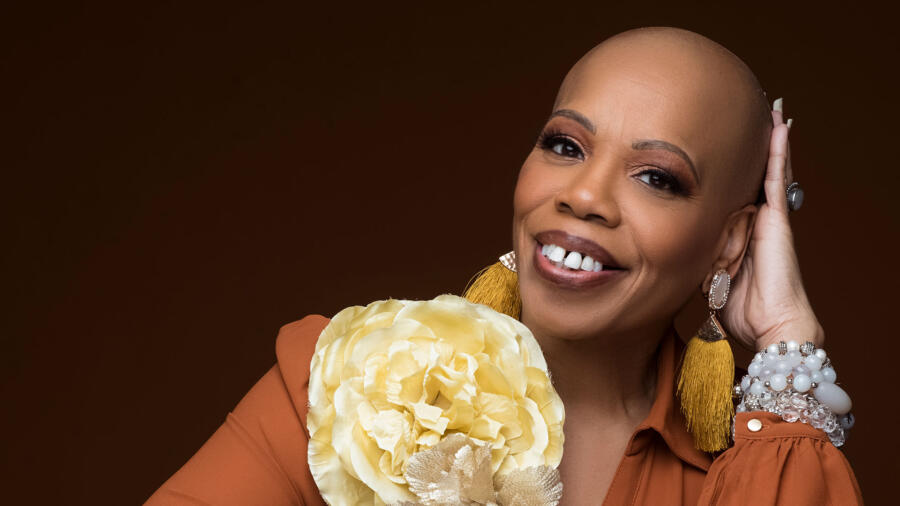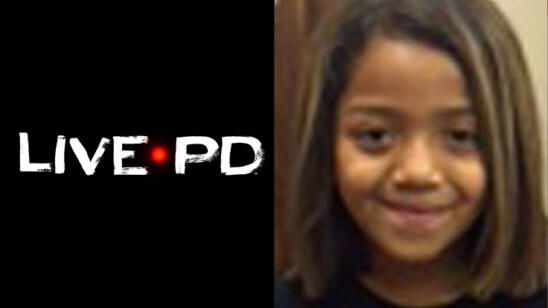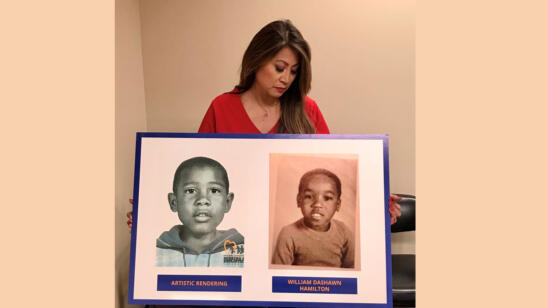Monique Smith couldn’t get her birth certificate.
Smith asked for the document dozens of times over her life, but each time, her mother refused to provide it. Without her birth certificate, Smith couldn’t join the Marines or Baltimore’s police department. She couldn’t go to college. For years, Smith worked for Johns Hopkins Hospital reviewing medical claims, “just praying every day they weren’t going to ask for an ID,” she says.
Smith had enough. She launched what would become a decades-long quest for the document. And in her search for answers, everything Smith thought was true about her life unraveled.
Smith grew up in Baltimore with an abusive mother and two of her (now deceased) uncles who she claims raped her for more than a dozen years. To escape the trauma, an 18-year-old Smith fled to Florida, where she fell into sex work. She eventually married, moved, got divorced and started a new life. “I wanted to live the story I wanted told, not the one that I was forced to be in,” she says.
The more Smith searched for answers, the more questions arose. Smith discovered that her mother had sought multiple replacement Social Security cards for her daughter—each under a different name. Smith’s relatives couldn’t tell her where she was born or who her father was.
Smith finally realized: The family who raised her wasn’t her family at all. “This woman had snatched me from New York, at the age of one,” Smith tells A&E True Crime.
Smith called the National Center of Missing and Exploited Children and asked the agency to add her to its list of missing children. “They said, ‘What do you mean?’ I said, ‘I’m a missing kid. I’m just all grown up. There’s got to be someone in your database looking for a baby,'” she recalls.
She became Missing Child Number 1201258. Later, a DNA analysis revealed Smith’s biological family: Her mother, who had died years before, was from New York, and Smith had six sisters. And finally, at 55 years old, Smith got her birth certificate: She was born Simboli Ruffin.
“I’m glad they didn’t see me wallow in self-pity,” Smith, now 58, says. “A lot of people are looking for validation instead of tapping into their own self-love. It’s hard for people to love themselves if they haven’t been loved. But you have to try to find what makes you happy.”
The Lifetime original movie on Smith’s life, Not My Family: The Monique Smith Story, premieres on April 12 and will be available to stream in the Lifetime app the next day. Ahead of its release, Smith spoke with A&E True Crime about her journey of discovering her real identity, having to convince people to help her along the way and what justice looks like for her.
How does the abuse you experienced throughout your life impact you today?
I use it for strength. I use that pain and turn it into purpose. There are so many children who are being sexually abused, physically abused, mentally abused—being abducted and trafficked.
I use all that pain because it doesn’t go away. I have triggers. People say, ‘You need to heal,’ but you can’t challenge the timeline that it takes people to heal. In my case, it’s going to last a lifetime. This was 16, 17 years of abuse, and then I went right into another realm of abuse, prostitution, running away from one situation into the next.
How did you survive that abuse?
You’re a child. You don’t know. I was abducted at one. I didn’t notice until I was almost 30 that I was abducted. The family that I was with, I assumed they were my biological family.
I was sexually abused at three and four, up until I was 18, by multiple people in the family. A lot of us children, we don’t realize that what is happening to us is wrong.
Our goal is to not disturb the environment: Do what you’re told. Don’t do anything to make them want to harm you. In my case, if it was raining, I would get abused because it was raining.
That environment is so unpredictable. How advice do you give people who are in those situations, or see them?
When I go to high schools and middle schools and youth programs, I tell them: Tell and tell until people believe you. I shared my story when I was 15 and 16. It paralyzes some people. Some people don’t know what to do to help you. So, I always say, ‘Tell until you get some resources.’
There was this moment, this split second, that I revealed to someone who came into the home that I had been abused. I had been beaten with a two-by-four. I lifted up a mattress to show them the two-by-four. I showed them the bruises on my back. They grabbed their mouth and gasped. But they never said anything. They just left. That was my one signal in the midst of all of this. They could have gotten me out, taken me to the authorities. But they didn’t do anything.
There are people witnessing these horrific acts, but they don’t know what to do. I tell them, write an anonymous letter. Make an anonymous phone call. Use somebody else’s phone to call in a tip.
The people who watched what happened to me have told me, as an adult, ‘Your mother was a bit rough. She was a bit firm.’ No, I almost died. Hopefully, that’s a message that is going to trigger someone who’s witnessing something right now to put a stop to the abuse.
What was it like to play detective when you’re the subject of your investigation?
It was the oddest thing: me coming in as the evidence and trying to convince people that I was the living proof that I was a missing child. There’s this idea that all missing children are dead. It was shocking to every entity that I went to—the FBI, CIA, police departments, you name it.
It sounds like you had a really difficult time convincing people to help you?
It was a struggle. It was also a time when identity theft was huge. I was told, ‘How do we know you’re not trying to falsify paperwork? You could be a criminal, trying to obtain a new identity.’ I was really shocked, but I also understood their role, so, it wasn’t like I was angry and frustrated.
When you finally got your birth certificate and got at least one of the answers you had been searching for, did anything change for you in that moment? Or has it since?
No, actually. I was thriving for so long, I was at the point that a piece of paper didn’t matter to me anymore. My legal name, it mattered. But I wasn’t going to let it consume me. If I had died before I found out, I needed to be OK.
When I got that paper, it was definitely a reward. But it was also like I had to start over. Like, am I one-year-old now? What do I do? How do I condense 50-something years into a name I just received in a day?
Are you still in contact with anyone from your childhood?
I’m not really close with that family, except for one person who raised me. For that person, it was a shock to learn that their biological father, their biological relatives, [committed] these horrendous acts of harm against me.
You have six siblings in your biological family. What is your relationship like with them?
I did meet all of my sisters, but everyone is living such different lives. We all know each other. We can reach out to each other.
What have you learned from them about what might have happened to you?
Not one bit.
My [birth] mother was a substance abuser, a drinker. She had seven kids by seven different men. People say, ‘How do you know that your mother didn’t sell you?’ No woman with seven kids is going to get rid of one child. The woman who stole me said to me, verbatim: ‘I’m going to my grave before you know anything.’ If my mother had sold me, then this woman would have said, ‘Your mother was on drugs, and I gave her a couple of dollars for you.’ But she hid what she did.
When she said that to you—essentially, ‘I’m taking these secrets to my grave’—and then, she died, did you feel a sense of loss? That she took something with her you may never know?
No, I was already disconnected from her and my childhood. This was a woman who, if I would walk into a room, she would throw something at my head for no reason whatsoever. So, when she said that, I had no feeling. It was almost like, ‘Yeah, you would do something like that.’
I never could get that woman arrested. I gathered so many things with her signatures on them, falsified documents. I tried to get her locked up. I wanted justice, but it never worked.
Is there justice for you—and what does that justice look like at this point?
I couldn’t stop what happened to me, and I can’t change my past. But if I can make sure there’s justice for other people, that’s justice for me.
Related Features:
Kamiyah Mobley’s Abductor Raised Her as a Daughter for 18 Years
Taken at Birth: The Hicks Clinic Stolen Babies
Kamiyah Mobley and Other Kids Who Grew Up Not Knowing They’d Been Abducted


